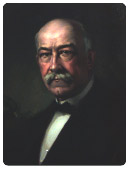Former justices

Justice James C. Kerwin
Wisconsin Supreme Court Justice: 1905–1921Life: 1850–1921
"His purposes of life were swayed by pure motives, his actions were guided by elevating principals of morality, and his conduct shows that he was an untiring warrior in defense of truth and the promotion of justice." – Chief Justice Robert G. Siebecker, Kerwin's memorial service (1922)
James Charles Kerwin was born May 14, 1850, in Menasha, Wisconsin. He attended high school in Menasha and received his law degree from the University of Wisconsin Law School in 1875.
After graduating, Kerwin practiced law in Neenah, where he served as city attorney for 12 years. He also maintained a law practice in Milwaukee until his obligations in Neenah became too time-consuming. Kerwin served as a member of the University of Wisconsin Board of Regents for three years.
In 1903, Kerwin was appointed to the Wisconsin Supreme Court. He declined the offer because of prior commitments to friends and clients. A year later, he was elected to the Wisconsin Supreme Court and was re-elected without opposition in 1914.
Chief Justice Robert G. Siebecker said of Kerwin's time on the Supreme Court: "He believed in and lived up to the principle that the administration of the law should be attended by a candid disclosure of everything involved in a dispute and that a trial in court should be a free and even contest for all the parties."
While on the Supreme Court, Kerwin was urged to accept an offer to be president of a large corporation, which would have more than doubled his salary. According to a colleague, he never considered the proposal because he felt that "such action would tend to discredit the judiciary and undermine the confidence of the people in its integrity of purpose."
Throughout his professional career, including his 16 years on the bench, Kerwin maintained his father's farm in Neenah. He kept it in operation until his death on January 29, 1921. Kerwin and his wife Helen Lawson had four daughters.

